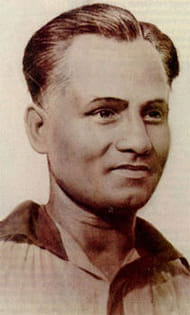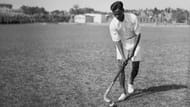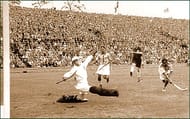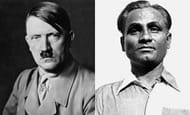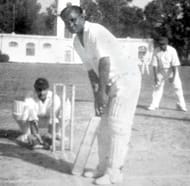“This is not a game of hockey, but magic. Dhyan Chand is in fact the magician of hockey.”
- A report in a newspaper after India’s triumph in the Amsterdam Olympics 1928.
Also read: Dhyan Chand: 10 interesting facts
A small conversation between me and my friend a few days back went something like this:
Me: Do you know how many centuries Sachin Tendulkar has to his name?
Friend: Yes
Me: Do you know how many World Cup trophies India has won in cricket?
Friend: Yes
Me: Do you know that India participated and won 3 gold medals in hockey in Olympics?
Friend: Not exactly
Me: Do you know that Major Dhyan Chand has three medals to his name?
Friend: Sorry, I don’t know much about military.
Me: Do you have any idea who he was?
Friend: Yes of course, he………Umm???
Me: Let it be. I will let you know.
Dhyan ‘Chand’ Singh, fondly known as Dhyan Chand, was an Indian hockey player, who brought India laurels with his hockey stick. He is the man who made Adolf Hitler leave the stadium mid-way during a match in the 1936 Olympics final against Germany, which India went on to win 8-1, with Dhyan Chand scoring six of those goals.
Tryst with Indian army
Dhyan Chand joined the Indian army at the age of 16 in the year 1921. He started playing army hockey tournaments in the year 1922, and continued playing them for the next four years, until 1926.
The Hindi word ‘Chand’ means the moon. Dhyan Chand used to practice a lot after his duty hours in the night and he used to wait for the moon to come out so that the visibility on the field improved. Because of this, his fellow players called him Chand, since his practising time coincided with the coming out of the moon.
Going by his performances in the army tournaments, Chand was selected for Indian Army’s tour of New Zealand. India won a total of 18 games, drew 2 and lost only once. Upon his return to India, Dhyan Chand was promoted to Lance Naik (equivalent rank to lance corporal in the Indian Army before 1947).
Many attempts were made to reintroduce field hockey in the Olympics, and the attempts were finally successful. The then newly formed Indian Hockey Federation (IHF) decided to send the best team for the 1928 Olympics which were to be held in Amsterdam, Netherlands.
In 1925, an Inter-Provincial tournament was organised to select India’s national field hockey team. A total of five teams participated in the tournament and Dhyan Chand got permission from the army to participate in the tournament and play for United Provinces.
In the first match against Rajputana (another team in the tournament), Dhyan Chand played in the Centre forward position. And quite early in the game Dhyan Chand and fellow player Marthins struck an amazing chemistry; their combination worked really well. Dhyan Chand scored the first goal of the match which took a deflection off the defender’s stick and went into the net.
The tournament turned out to be a success and it was decided that it would be held every two years. After another round of trial matches, the Olympics team was selected with Dhyan Chand as a centre forward. The Olympic team played a match against Bombay XI prior to their departure to England and surprisingly lost the match 3-2, with Dhyan Chand netting both the goals.
There have been reports that Great Britain didn’t send their team to the 1928 Olympics because they had lost to the Indian side when they played in Folkestone. This is referred to in Mohan Lal Kapur’s book “Romance of Hockey”.
Olympics 1928
The Indian team arrived in Amsterdam on 24th April for the Olympics. Before beginning their real journey of the Olympics, India played a few pre-Olympic matches with local teams and registered comprehensive wins.
In the 1928 Olympics, the Indian team were put in the table alongside Austria, Denmark, Switzerland and Belgium. On 17th May, the Indian hockey team made its Olympics debut against Austria and went on to win the game 6-0.
The final match took place on 26th May in which India faced the hosts Netherlands. India went into the match with illness to key players, but came out victorious. Dhyan Chand scored 14 goals in 5 matches and was the top scorer of the tournament.
India received its heroes in thousands of numbers, compared to a handful who had come to see them off when they were leaving for the tournament.
The Indian Hockey Federation wrote to the Army Sports Control Board to grant Dhyan Chand leave to take part in the Inter-Provincial tournament as the IHF was ready to select the team for the next Olympics. Dhyan Chand at that time was posted in Waziristan.
Dhyan Chand was selected in the Olympics team without any formalities but the rest of the squad had to show their skills to get selected. A total of seven players from Punjab were selected. Dhyan Chand’s brother was also selected in the squad as a left-in.
1932 Los Angeles Olympics
The Indian team played practice matches in India before leaving for Colombo. In Ceylon, the team played two matches against All Ceylon XI and won both the matches with huge margins, 20-0 and 10-0 to be precise. A newspaper report after the first match read: “Perfection is perilous, for it tempts the gods. For once, this was proved wrong for even the god of weather paid tribute to the genius of the Indian players. Rain clouds, which had threatened to ruin the game, vanished into the blue, and thousands of spectators spent a happy hour marvelling at the incomparable artistry of the Indian team.”
The Indian team reached Los Angeles, three weeks before the opening ceremony of the Olympics. In the final of the 1932 Olympics, India faced the hosts USA and won the match 24-1. This was a record score at that time. Chand scored eight goals and his brother Roop Singh scored 10 goals. Together they put on 25 goals during the tournament and hence were known as the ‘hockey twins’
Dhyan Chand is known as ‘Hockey ka jaadugar’ (Magician of the hockey game). It has been widely reported that Dhyan Chand used to practice on the railway tracks by keeping the ball on one track and playing with it till 1 or 2 km without letting the ball fall off the track.
Captaining the side and 1936 Berlin Olympics
Dhyan Chand was named the captain of the Indian team in 1934 when the Nawab of Manavadar refused to captain the side which was leaving for a tour of New Zealand.
In 1935 the IHF organised another Inter-Provincial tournament to select the team for the 1936 Olympics. Upon the selection of the squad, the final team assembled at Delhi and played a match against the Delhi XI, and interestingly went on to lose the match 4-1.
The team reached Berlin on 13th July 1936. Four days later, the Indian team played a practice match against Germany and lost the game 4-1. Manager Pankaj Gupta informed the IHF about a replacement for Mirza Masood who was out of form, and asked the IHF to send Ali Dara to replace him.
The Indian team played the first match in the Olympics and won comprehensively against Hungary. India progressed to the finals defeating USA, Japan and France on their way. Meanwhile, Germany defeated Denmark, Afghanistan and Holland and booked their place in the finals.
India had to face Germany in the finals. The Indian players were pretty nervous thinking about the fact that they had already lost a game to Germany when they played them in a practice match before the start of the tournament. But India came out victorious, handing Germany an 8-1 defeat. Germany was the only team to score against India in the entire tournament.
There were many flawed reports which claimed that Dhyan Chand scored six goals in the final. However, Dhyan Chand in his autobiography titled ‘Goal!’ published in 1952 wrote:
“When Germany was four goals down, a ball hit Allen’s pad and rebounded. The Germans took full advantage of this and made a rush, netting the ball before we could stop it. That was the only goal Germany would score in the match against our eight, and incidentally the only goal scored against India in the entire Olympic tournament. India’s goal-getters were Roop Singh, Tapsell and Jaffar with one each, Dara two and myself three.”
Dhyan Chand scored 33 goals in 12 matches in the three Olympic tournaments.
When Dhyan Chand met Adolf Hitler…
During the final match between Germany and India in the Berlin Olympics 1936, Hitler left the stadium halfway through the match, as he couldn’t see his team lose.
Later when Hitler came to know about Dhyan Chand’s performance, he expressed his desire to meet him, and the same was conveyed to Dhyan Chand.
The next morning Dhyan Chand was standing in front of Hitler. Hitler took a look at the sub-standard canvas shoes of Dhyan Chand and enquired “what else you do, when not playing hockey?”
Dhyan Chand: I am in Army.
Hitler: What is your rank?
Dhyan Chand: I am Lance Nayak.
Hitler: Come over to Germany and I will make you a Field Marshal.
Dhyan Chand was in a bind, not understanding whether it was an instruction to him by the Supreme Commander of the mighty German Army, or an offer. Breaking his silence after a few seconds,
Dhyan Chand replied in chaste Hindi, “India is my Country, and I am fine there”.
None of the generals accompanying Hitler could respond to the patriotic rebuff rendered by the plucky Indian soldier.
Hitler is said to have taken his eyes off Dhyan Chand’s canvas shoes briefly and retorted, “As you like it ” and stomped away in a huff.
Military promotion and life after Berlin Olympics
Upon his return from Berlin, Dhyan Chand joined his regiment and largely confined himself to army hockey between 1936 and the commencement of war in 1939. Dhyan Chand took part in the Beighton Cup. After the Beighton cup, Chand spent four months in a military camp to attend military lessons and later he was promoted to Lieutenant.
In 1947, the Asian Sports Association (ASA) requested the Indian Hockey Federation to send a team to play a series of matches; the ASA also put forth a condition that Chand should be included in the team. Thus, Chand was named the captain of the team. The team reached Mombasa on 15th December and played a total of nine matches in British East Africa, winning them all. Although Chand was in his forties, he still managed to score 61 goals in 22 matches.
Dhyan Chand led the Rest of India team against the Bengal side in his last match, which ended in a draw. After the completion of the match, the Bengal Hockey Association organized a function to honour Chand’s services to Indian hockey.
In 1956, Dhyan Chand retired from the army with the rank of Major and in the same year he was conferred India’s third highest civilian honour, the Padma Bhushan, by the Government of India.
After Dhyan Chand retired he coached for a while, and then settled in Jhansi. However, the last days of Dhyan Chand’s life were not very memorable, as he was short of money and was ignored by the nation. He once went to a tournament in Ahmedabad and they turned him away not knowing who he was. He developed liver cancer in the latter stages of his life, and was sent to a general ward at the AIIMS, New Delhi.
Has the Government of India done enough to honour such a sporting great?
Has India forgotten its legend?
In a country obsessed with cricket, are we contributing equally to lift the sport which once brought glory to India?
It is high time people realise the achievements of Major Dhyan Chand, who revolutionised this sport and won respect for our country through this game.
